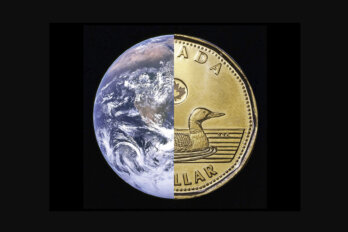Montreal-based activist Dexter Xurukulasuriya, known by friends as “dxtr x,” hasn’t had a lot of cash or spare time since COVID-19 broke out. They’ve been working with their direct-action and mutual-aid organization, Rest2Resist, to help feed street-based folks. For Xurukulasuriya, who has been a climate activist for about twenty-five years, the crisis was well underway before COVID-19 hit.
People of colour, Indigenous people, people with disabilities, recent immigrants, sex workers, and LGBTQ folks are more likely to live in poverty and face a dearth of access to food, water, health care, and housing. When a global health crisis breaks out, these are the groups that often suffer most. And, because they’re also more likely to have jobs in the service sector—jobs designated “essential”—they are typically unable to work from home. Marginalized people are also less likely to have access to diagnostic testing and treatment—such is the case for Black Americans, who are dying of COVID-19 at more than three times the rate of white Americans, according to a study by the APM research lab. Though racial data wasn’t collected in Canada in the early days of the virus, Black neighbourhoods in this country have also been disproportionately affected by the pandemic.
But COVID-19 is far from the only threat. Climate damage—the crisis that Xurukulasuriya and activists like them have spent years fighting—also affects these groups disproportionately. Zoonotic diseases like COVID-19 are becoming more prevalent because the animals carrying them, spurred by climate change, are coming into closer contact with urban centres. Humans are pushing into their habitats as well, through things like resource extraction. And both kinds of crisis only magnify preexisting inequalities.
This also means it might be possible to solve them in tandem. If we play this moment right, COVID-19 could represent a crucial turning point in mitigating the damage we’ve done to the planet and our social structures. As we strive for a more equitable society, we have a critical opportunity to come together and rethink both climate and health policy. Alternatively, our action on climate change could grind to a halt almost entirely, becoming completely eclipsed by the pandemic’s social and economic fallout.
The toll of the disease has been unspeakably tragic, with more than 788,000 lives lost worldwide. At the same time, when so many of us were still in lockdown, the Earth had a chance to breathe. Even if the dolphins aren’t actually “returning” to Venetian canals (as a fake viral social media post suggested), satellite imagery from the European Space Agency shows a roughly 40 percent reduction in nitrogen dioxide emissions over cities in China between December and March, the time people were asked to stay home to prevent the spread of the pandemic. Back in March, the famously murky air over LA was better quality than it had been in decades. In India, people over 160 kilometres from the Himalayas were able to see the mountain range for the first time in about thirty years. But, while temporarily lowered emissions are encouraging, they don’t represent a permanent shift. Unless we change our behaviours more significantly, we’re likely to face more pandemics like this down the line.
Kerry Bowman, a bioethicist and environmentalist who studies zoonotic diseases, says the pandemic reflects the wider environmental degradation and biodiversity loss that’s been happening for years. “There are huge parallels between COVID-19 and climate change,” says Bowman, who was also on the front lines during the 2003 SARS outbreak. SARS, too, appeared to have emerged from a wildlife market in southern China. “The biggest message at that time for me was that the consumption of wildlife, unbridled, is a profound global public health risk.”
Bowman explains that various ecosystems, particularly forests, have suffered major losses in recent years. According to Bowman, in Southeast Asia, central China, and southern China, various species are being forced into smaller areas, and animals that wouldn’t normally be in contact are being pushed together. With the change in climate, animals are also moving into new, often urban areas in pursuit of the disappearing environments they need in order to live. This means other species are being pushed closer to humans, creating conditions for the transmission of zoonotic diseases. What’s more, crowding animals into tighter spaces, which has been exacerbated by the global rise of factory farming, stresses them out, causing greater viral outbreaks. “When people talk about preventing a pandemic, they talk about, ‘Do we have enough drugs and PPE?’” Bowman says. “But we’ve got to go further upstream than that.”
Human wellness and planetary wellness are inextricably linked, and that link must be taken into account in order to save us. Bowman points out what should be obvious: “Human beings cannot flourish and maintain health without healthy ecosystems to live within. That’ll be one of the biggest lessons of the twenty-first century, and I think COVID-19 points us in that direction.”
Humans have a strong track record of reviving capitalism after it flails—and, what’s more, many people want to return to a recognizable way of life. That’s what happened after 2008’s global recession. In 2010, emissions grew 5.9 percent, more than offsetting the 1.4 percent decrease we saw the year before. Similarly, post-COVID-19 government attention and stimulus packages will be focused on jump-starting the economy. Energy economist Mark Jaccard, author of The Citizen’s Guide to Climate Success: Overcoming Myths that Hinder Progress, warns that there will be a speedy push for the economy to return to “normal” and that, without policy change, levels of pollution will skyrocket back to where they were before.
Environmental standards could be weakened even further, along with the monitoring of those standards. The Canadian Association of Petroleum Producers already sent a letter to the federal government in March asking it to freeze the carbon tax, as well as any new climate regulations, until the “unprecedented fiscal challenges” it is experiencing ends.
In order to exert meaningful climate action, we’re going to need widespread public cooperation—which, the pandemic is teaching us, may be easier said than done. While public health experts tell us that physical distancing and mask wearing are sensible acts that will help protect everyone, in early April, an Ipsos poll for Global News found that a quarter of Canadians would not commit to practising physical distancing measures.
“COVID-19 is a collective-action problem,” says Kathryn Harrison, a professor of political science at the University of British Columbia whose work focuses on climate. Speaking during the lockdown, Harrison said that people realized staying home would flatten and drive down the curve. “That’s the challenge we face with climate change.”
At the same time, this is a critical moment for governments to devise policies that serve the communities they have neglected. Damon Matthews, the Concordia University research chair in climate science and sustainability, says the government should consider initiatives that address the climate crisis and social inequality simultaneously. “Dealing with inequality could make a compelling contribution to progress on climate,” he says. “People are in a position to make faster and more dramatic progress on climate action if they’re starting from a more level playing field.”
But Matthews warns that the government may not be able to take the same strong action on climate as it has on COVID-19. Denialism has a lot to do with this: a sizable chunk of people insist on doubting the existence of climate change, whereas the existence of COVID-19 is, for most, undeniable. (This despite the existence of “COVID truthers,” conspiracy theorists who think the pandemic can be beat by, among other tactics, strengthening individual immunity. If one were to create a Venn diagram of climate deniers and COVID truthers, the overlap would likely be significant.)
Furthermore, the fact that wealthier people are less affected by both climate destruction and the pandemic doesn’t bode well for our chances of stepping into a new world on the other side of this outbreak. Those in a position to influence policy are safe at home, on their laptops, rather than facing the dangers on the front lines, as a disproportionate amount of low-income people are forced to do.
Nonetheless, Harrison, too, is crossing her fingers that government policies will address systemic change. For her, this is not only a chance to start over but a chance to make a transition to cleaner energy much sooner than anyone previously assumed possible. “This is a once-in-a-lifetime moment where governments are going to spend very large amounts of money,” she says. “Let’s not blow it by investing in an economy that we know we need to leave behind.”
While the idea of a Green New Deal has been associated with the New Democratic Party in Canada and the Democratic Party in the US, and has been an inflammatory concept for many on the right, Harrison says that, going forward, in theory, the idea could be a nonpartisan one. That way, Harrison says, we can ensure that our climate policy is founded in justice.
Some elected officials are already thinking about this. In February, Nova Scotia MP Lenore Zann introduced Bill C-230, the National Strategy to Redress Environmental Racism Act, which will move on to its second reading in the House when Parliament reconvenes in September. The bill addresses the fact that neighbourhoods where Indigenous and other racialized people live are often exposed to hazardous environmental conditions, like landfills and toxic waste sites, and proposes consulting with communities to create policies to solve these problems.
While private member’s bills rarely become law, this one could see unusual levels of support due to the explosive momentum behind recent antiracism movements protesting anti-Black and anti-Indigenous violence and calling for the defunding and abolition of police departments. This isn’t the first time Zann has proposed a bill like this, though. She drafted a similar provincial bill in 2017, after working with Ingrid Waldron, author of There’s Something in the Water: Environmental Racism in Indigenous & Black Communities. The bill didn’t pass, but this time, it’ll likely be harder to ignore.
There’s no way to know what will come next. But there is some cause for hope: many people are showing up for marginalized communities for the first time, protesting for Black lives and committing to antiracist practices both personally and institutionally. The pivoting of business models during this public health crisis has also proven that work life can be structured differently: many people can Zoom to work or otherwise work from home. The work-from-home suggestion is far from equitable—not everyone has the ability to do it—but it’s clear that the amount we travel can change overnight. If there’s ever been a time to exert mass change, this is it.
For Xurukulasuriya, no form of the status quo is ever going to work. “COVID-19 has shown more leadership on climate than any elected leader, and the ‘normal’ they want to get back to was a horrible abnormality.” They believe we should make the best of this crisis by working to create a more caring, compassionate society. “When anything toxic happens,” they say, “people can become activists. Take the opportunity now.”





